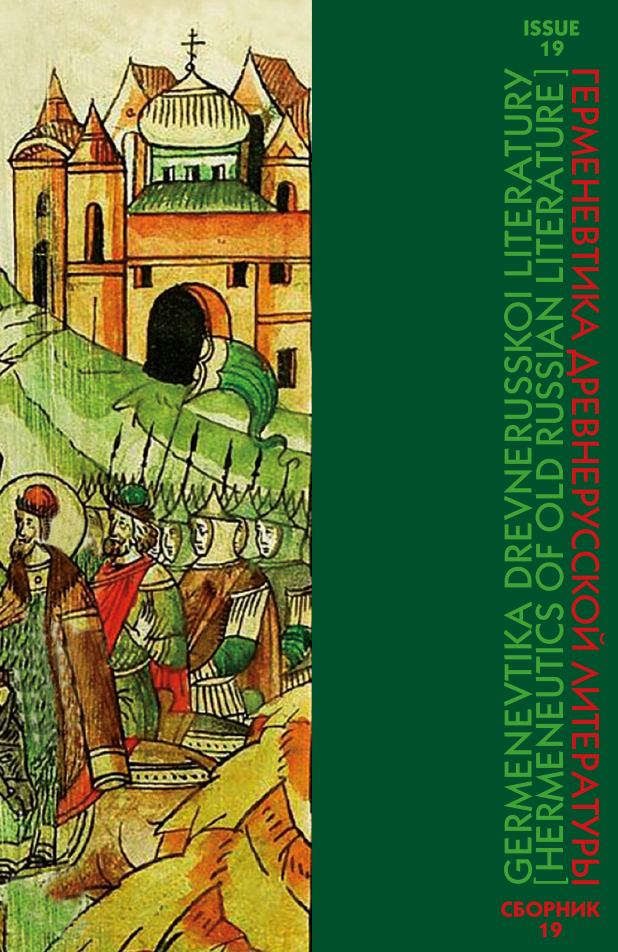Abstract:
The article focuses on the importance of old Russian literature in the works by Sasha Sokolov, with a specific reference to his first book A School For Fools (1976). The analysis of this text takes into account lexical choices made by the author and their meaning in the context of the narration. This approach lies at the basis for the proposal of a tripartite model that describes the relationship between Sokolov’s works and the old Russian tradition. The model includes the following categories: 1. Allusions to religion; 2. Presence of elements pertaining the realm of folklore; 3. Allusions to episodes or figures related to old Russian literature. The results of this research contribute to the broadening of knowledge in the field of contemporary Russian literature and its relations with the old literary heritage. Moreover, this investigation allows a deeper comprehension of Sokolov’s writing style.
References:
- Brainina, D. “Sasha Sokolov kak kliuchevaia figura russkogo postmodernizma” [“Sasha Sokolov as a Key Figure of Russian Postmodernism”]. Russkaia rech’, no. 3, 2007, pp. 19–24. (In Russian)
- Vaiman, N. “Poverkh bar’erov. Beseda s Sashei Sokolovym” [“Over Barriers. Conversation with Sasha Sokolov”]. Novaia literaturnaia karta Rossii. Available at: http://www.litkarta.ru/dossier/vaiman-sokolov-interview/view_ print/ (accessed 31 August 2020). (In Russian)
- Voronel’, , and Voronel’, N., and Sokolov, S. “Ia khochu podniat’ russkuiu prozu do urovnia poezii. (Beseda s Sashei Sokolovym, USA, 1983)” [“I Want to Elevate Russian Prose to the Level of Poetry. (Conversation with Sasha Sokolov, USA, 1983)”]. 22, no. 35, 1984, pp. 179–188. (In Russian)
- Vrubel’-Golubkina, I. “Sasha Sokolov: ‘Skol’ko mozhno na polnom ser’eze musolit’ vneshnie priznaki bytiia?’.” [“Sasha Sokolov: ‘How Long Can One Seriously Linger on the External Signs of Being?’.”]. ru, 31.10.2011. Available at: http://os.colta.ru/literature/events/details/31471/ (accessed 31 August 2020). (In Russian)
- Zorin, A. “Nasylaiushchii veter” [“Sending Wind”]. Novyi mir, no. 12, 1989, p. 253. (In Russian)
- Kislov, V. “Repetitsiia reinkarnatsii (Retsenziia knigi Triptikh)” [“Rehearsal For Reincarnation (Review of the Book ‘Triptikh’)”]. Novoe literaturnoe obozrenie, 113, no. 1, 2012. Available at: https://www.nlobooks.ru/magazines/novoe_ literaturnoe_obozrenie/113_nlo_1_2012/article/18522/ (accessed 31 August 2020). (In Russian)
- Rinker, F., and Maier, G. Bibleiskaia entsiklopediia Brokgauza [Bible Encyclopedia Brokgauz]. Kremenchug, Khristiians’ka zoria Publ., 1994. Available at: https:// ru/otechnik/Spravochniki/biblejskaja-entsiklopedija-brokgauza/ (accessed 31 August 2020). (In Russian)
- Sokolov, S. Shkola dlia durakov. Mezhdu sobakoi i volkom. Palisandriia. Esse. [A School For Fools. Between Dog and Wolf. Palissandreide. Essays]. St. Peterburg, Azbuka Klassika , 2009. 601 p. (In Russian)
- Sokolov, Triptikh [Triptic]. Moscow, Ogi Publ., 2011. 267 p. (In Russian)
- Boyd, Vladimir Nabokov. The American Years. Princeton, Princeton University Press, 1991. 783 p. (In English)
- Caramitti, M. Letteratura russa contemporanea. La scrittura come resistenza. Roma, Laterza, 332 p. (In Italian)
- Halperin, C.J. Russia and the Golden Horde: the Mongol Impact on Medieval Russian History. Bloomington, Indiana University Press, 180 p. (In English)
- Heller, “A World of Prettiness: Socialist Realism and Its Aesthetic Categories.” The South Atlantic Quarterly, vol. 94 (3), 1995, pp. 687–714. (In English)
- Johnson, B. Introduction for Sasha Sokolov’s School for Fools. Elkost. International Literary Agency. 2012. Available at: http://www.elkost.com/authors/ sokolov/media/854-introduction_for_sasha_sokolov (accessed 31 August 2020). (In English)
- Marchesini, “Intervista a Sasha Sokolov.” Levigati dall’assenza. La costruzione del personaggio nella prosa metafinzionale russo-sovietica. Roma, UniversItalia, 2018, pp. 219–222. (In Italian)
- Nabokov, V. The Real Life of Sebastian Knight. London, Penguin, 2001. 192 p. (In English)
- Richardson, Unnatural Voices. Extreme Narration in Modern and Contemporary Fiction. Columbus, Ohio State University Press, 2006. 166 p. (In English)
- Robin, Socialist Realism: an Impossible Aesthetic. Stanford, Stanford University Press, 1992. 345 p. (In English)
- Saronne, E. Il Cantare di Igor’. Parma, Pratiche, 1991. 297 p. (In Italian)






